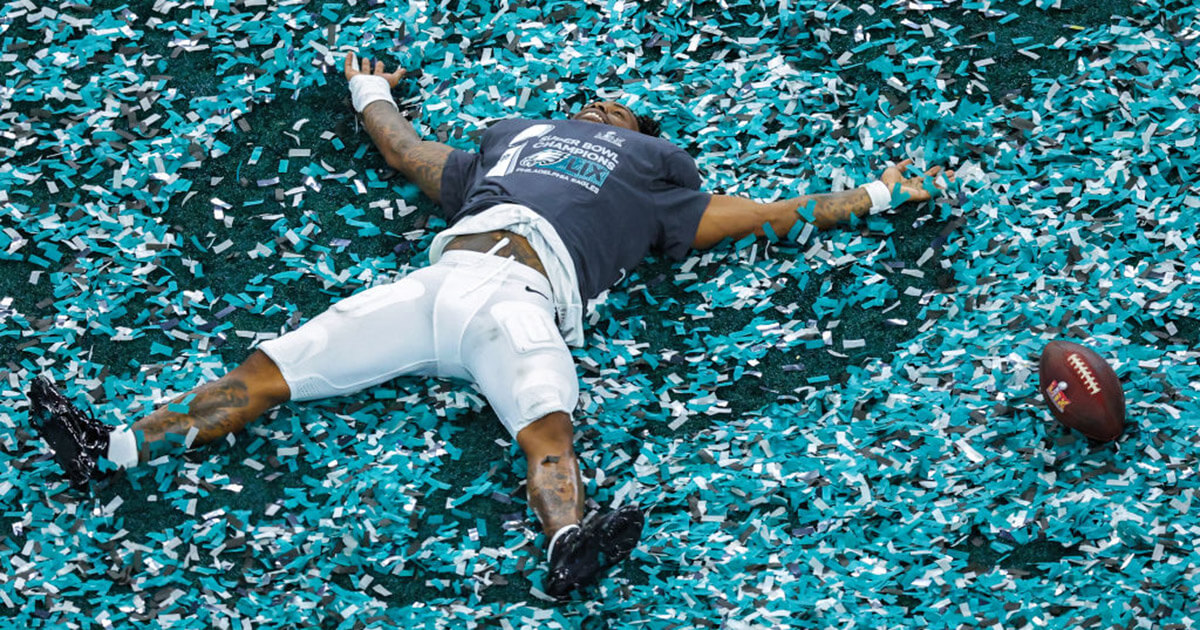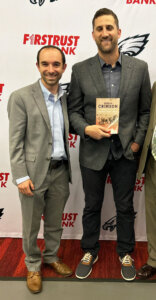Did the weekly Torah portion predict the winner of the Super Bowl?
The section of the Book of Exodus read at synagogues mentions ‘red chiefs’ and ‘wings of eagles’

C.J. Gardner-Johnson of the Philadelphia Eagles celebrates in confetti after beating the Kansas City Chiefs, 40-22, to win the 2025 Super Bowl. Photo by Patrick Smith/Getty Images
The Red Sea split, paving an improbable path. Water became walls on either side, towering and still. As Pharaoh’s chariots thundered in pursuit of the fleeing Israelites, nations on the sidelines watched in awe.
“The Edomite chiefs were gripped in terror,” reads Exodus 15:15. The Hebrew word for “red” is edom, leading some translations to render the phrase as the “red chiefs.”
It was the Torah portion read worldwide the day before Super Bowl Sunday. And then, as if the heavens were scripting the weekend, the Philadelphia Eagles trounced the Kansas City Chiefs, 40-22. Was this fate? Was this prophecy? Was this God’s plan all along?
In Philadelphia, where sports and superstition intertwine like the leather laces of a football, the faithful were already looking ahead — to the upcoming Torah portion.
In Parshat Yitro, which will be read this coming Shabbat, God tells Moses: “You have seen what I did to Egypt, and that I carried you on wings of eagles and brought you to me” (Exodus 19:4). It’s the prelude to the giving of the Ten Commandments at Mount Sinai, but for Eagles fans, the symbolism was impossible to ignore.
And God said to the Israelites: "I carried you on eagles’ wings" (Exodus 19:4) pic.twitter.com/2LdzoasH8Z
— Benyamin Cohen (@benyamincohen) February 10, 2025
Rabba Rori Picker Neiss, senior vice president for community relations at the Jewish Council for Public Affairs, lives in Philadelphia with her husband and three children. On Sunday, they hosted a Super Bowl party for a pack of 10-year-olds in their basement.

“There are these moments when it feels like the entire country pauses and unites around one central event,” she said. “And seeing that reflected in ancient tradition — it just feels like a sign. Like a reminder that God and religion and Torah are still relevant in day-to-day life.”
Of course, not everyone was convinced of the connection between Torah and touchdowns. Across the city, others were engaging in their own versions of this sacred postgame reflection. At Congregation Rodeph Shalom, Cantor Bradley Hyman chuckled when asked about the supposed theological significance of the Eagles’ win.
“I don’t know if that’s what God intended,” he said. “But if it gets people to pay closer attention to the Torah portion, to find new meaning in it — that’s a beautiful thing.”
Hyman has gotten on the bandwagon in other ways. Philadelphia’s cantors (and their families) gathered via Zoom last week to sing a Hebrew rendition of the Eagles’ fight song.
Faith, football and fate
There’s no denying that football is more than just a sport. It is a religion unto itself, with its own rituals, its own saints and sinners, its own prayers in the waning moments of the fourth quarter.

Rabbi Zev Eleff, a Philadelphia-based historian of American Judaism and author of a book on faith and football, sees the intersection of sports and spirituality as inevitable. “The two most superstitious elements of American life are religion and sports,” he said. “There’s ritual behind both. There’s an absolute defense of tradition. The fight we have over the pitch clock in baseball is like the battle over kitniyot on Passover.”
There’s something poetic about that comparison: Jewish law has argued for centuries about whether rice and beans should be considered bread during Passover, while baseball fans spent all of last season debating whether shaving 30 seconds off a game was an act of heresy.
And, as with all belief systems, there’s the need for a villain.
“Everybody has an Amalek,” Eleff said, referencing the biblical enemy of the Israelites. “It’s the team you can’t stand, the one you need to see defeated.” For him, that’s the Pittsburgh Steelers.
The theology of the gridiron
Eleff, the president of Gratz College, is particularly interested in the way athletes become symbolic exemplars — modern-day figures of admiration and moral expectation. It’s a topic he dives into in his forthcoming book, The Greatest of All Time: A History of American Obsession, where he explores the public fascination with icons like Muhammad Ali, the Beatles and Babe Ruth.
“Just like we want our rabbis to embody our beliefs, we want our quarterbacks and running backs to be role models, to represent something bigger than themselves,” he said. “We like their stories, their struggles.”
Still, if sports are a kind of faith, then loss must serve some higher purpose. “For Kansas City, this humanizes quarterback Patrick Mahomes,” Eleff said. “It makes him more like us.” Watching him lose is, in some ways, like watching Moses get exiled before reaching the promised land — it doesn’t diminish his greatness; it just makes the story better.

This, Eleff points out, is why many sports have an award for Comeback Player of the Year. “It’s essentially a rabbinic sermon on repentance and perseverance.”
Picker Neiss sees an even grander lesson.
“Sports are a way to connect to something larger than ourselves,” she said. “We’re sharing our highest highs and our lowest lows with people who are cheering alongside us and who are mourning alongside us. I feel that, especially now, when it’s so easy to feel polarized and divided, having that connection to a total stranger is heartening. It makes us feel less alone.”
By the time the “wings of eagles” Torah portion is read this Saturday, Philadelphia synagogues will be hosting their celebratory kiddush spreads.
And one thing is certain: “The napkins,” said Eleff, “will be green.”

















